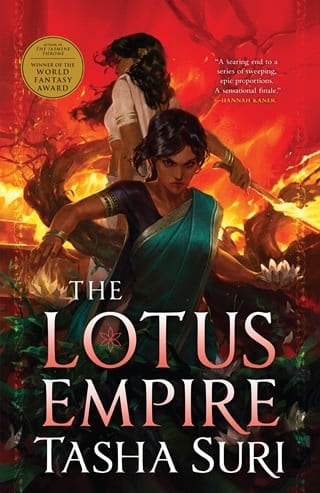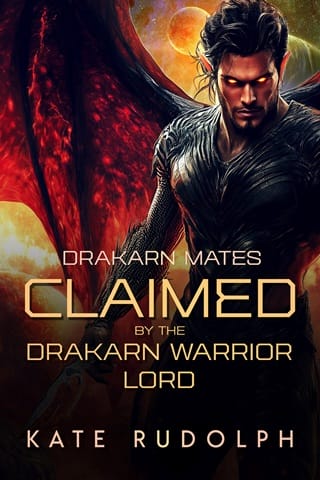Chapter 51 Rao
RAO
The priests had been praying for what felt like hours. Torches had guttered and been relit. The air smelled of smoke and bodies. There were no windows in this hall. Rao did not know if night had fallen or if the sun still shone beyond the dark walls. The priests and Bhumika were a crescent of bodies, gold and dark in the flickering light.
He stood at the entrance of the hall with Jeevan and his own soldiers, his heart’s-shell dagger clenched in his fist. At his urging, his men had taken what heart’s shell they had and bound those daggers and arrowheads to spears taken from the monastery’s own guards. But he could not bring himself to do the same with his own weapon. The closer the stone was to his skin, the less he felt the pulsing voice of the nameless in his skull.
He wished he had more of his men with him. He wished he had more heart’s shell. But he’d done his best. He had left one of his best archers on the monastery roof, ready to shoot a heart’s-shell arrow if he saw a yaksa approach.
If the heart’s shell could kill the yaksa outright, that would be… easier. But he did not think it likely. Still, better to try than not.
Rao moved his dagger hilt back and forth in his palm: slow, even motions, as he tried to keep himself calm. Jeevan did not seem to need anything to ground him. He stood there calmly, one hand on his saber, the other neatly behind him.
Rao gestured to one of his men. At his unspoken urging, the soldier removed a spare heart’s-shell blade from his belt and placed it in Rao’s hand.
“Here,” Rao said, and held it out to Jeevan. “Make your own spear. You’ll be of more use properly armed.”
Jeevan eyed it without any expression, but he took it after a moment and nodded his thanks.
Rao turned away, fixing his gaze on Bhumika again. Her eyes, previously closed, were now open and fixed on the door.
The ground shook—a deep tremor. In flashes of shadow and golden light, he saw green things begin to worm through the stone walls. His men hissed and cursed, stepping away from the edges of the room.
“The yaksa is coming,” Bhumika said. “Do not stop praying.”
The priests were chanting mantras, their voices swelling to fill the room.
There was a groan like the splintering of wood and stone. A guttural cry followed, so wild and alien that it made a chill run down Rao’s spine.
The man Rao had sent to the roof had possessed a conch to sound in warning. No warning note had been blown. Either the man was dead, or the yaksa had crawled through the stone foundations of the monastery into its innards without ever walking across the threshold. Rao had been a fool to think it would approach like a person.
The ground shook harder, cracks spidering along the ancient walls. Rao gripped his dagger tighter and watched as the soldiers around him readied their spears. Sweat was crawling down his neck.
The yaksa appeared at the entrance of the hall, limned in shadow. It smelled powerfully of petrichor and blood. It had a human shape and an uncannily human face, but its eyes were clusters of shells, its body all roots packed with wormy soil.
Rao could not have moved if he had tried. A cold horror settled over his limbs, holding him for one second that stretched like lifetimes.
The yaksa only had eyes for Bhumika, who kneeled calm and unmoving in her crescent of priests. Their prayers had faltered, ebbing like water.
“I feel you,” the yaksa said. Its voice clinked like bones, rattling in his ears. “Temple child. Broken husk. I felt you from beneath the soil. Where is the other?” A turn of that head; a snapping, creaking noise of stone. “I felt the stronger one but they are—gone. There is only you. Will you take me home?” the yaksa asked, stumbling forward. It sounded as hopeful as a child. “Why are you here, kin? Above dead waters?”
Bhumika met the yaksa’s eyes.
“Surely you know,” she said. Her voice hardened. “Hold the yaksa in place. Now. ”
Her order broke their awe and terror as well as a blade. Rao’s warriors surged forward.
The yaksa screamed , and the ground trembled so violently that Rao almost lost his footing. He heard the clang of at least one spear falling. Roots burst through the walls, lashing out at anything and anyone they could touch. There was a bang as one of his men was flung bodily against the opposite wall, then dropped to the floor. The priests were still kneeling, praying frantically.
Rao went cold, then focused. He had trained as a warrior in Harsinghar alongside Aditya and Prem, trained in sabers first and foremost. But he had still been a prince of Alor, bred to Aloran warfare, and he had kept his heart’s shell in dagger form for a reason beyond fear. He knew how to throw a dagger.
He aimed for a difficult target—the throat. The dagger left his hand. For a moment he was not sure it would meet its mark. Time stretched into vastness.
Then he heard the thud of the blade. The yaksa stumbled, blade jutting from its throat.
His men leapt.
Four spears pierced the yaksa, and four soldiers held those spears in place, their knuckles white with tension and their faces blanched with terror. Jeevan was one of those men, arms trembling with the strain. The heart’s shell made the yaksa howl. Around those spears it bled green-black blood, thick gouts that spilled and flowered into vines on the stone floor.
“We cannot hold it for long,” Jeevan bit out.
“We don’t need long,” Bhumika replied.
“You,” the yaksa gasped. Its hand stretched out toward Bhumika. “Why would you betray your own? Your kin?”
“Think of the nameless,” Bhumika called, not meeting its eyes. “Call upon the nameless in your heart.”
“I felt Mani Ara,” the yaksa said, its voice a wet creak of splintered wood—of insects in wood marrow, eating it whole. “I felt my mother. Where is she? You are not her. A single flicker of her, and now she is gone.”
“Open yourself to the nameless,” Bhumika said, her hands tight upon her knees. “Think of nothing else. Be empty .”
“Temple child,” the yaksa gasped. “You’re broken from the waters—torn from your roots. You are empty, and dead in all the ways that matter.” It tried to worm closer; it was weeping, its tears sap and rot and blood. “But I came here for you,” it said, its voice yearning—frighteningly human. “I came here for kin. Are we not bound, little one? Are we not family to one another, born from the same waters?”
The pressure in the temple was growing stronger and stronger. It reminded him of the snowstorm he and Sima had been caught in when they had traveled beyond the Lal Qila: a sudden dimming of light, a hush in the air, a growing silence, heavy, like a breath waiting to be exhaled. There was no darkening sky here, but the glow of the lanterns looked oddly blue. In its lights, the priests and the worshippers were colored in the indigo of deep waters. Most of them had their eyes closed, hands clasped, and faces lowered.
In the center of it all, the yaksa writhed like a landed fish, all its limbs contorting at awful angles.
He kept his eyes on it. He knew it was foolish. And yet…
No heart’s shell was touching him anymore. Fire, as if it had been waiting, began to bank behind his eyes. It was the fire that urged him to tilt his head toward Bhumika instead.
Bhumika was sitting straight and tall, knees tucked beneath her, her shoulders back. Her expression was not calm—it was tense, her brow furrowed, her jaw set.
The shadows were moving strangely around her. He watched them move, flickering with the lantern light. Twisting, reshaping. Figures, they looked like figures, veiled and strange.
Those are not real shadows , his mind whispered. You are not seeing them with your eyes.
The vision is within you.
“When you have faith, you become a vessel,” said Bhumika, her voice stretching across the hall. “You empty yourself. You became a living void where a god may land—as easily as a leaf on waters. Pray as Divyanshi prayed over the waters of your monastery. You have in you what she possessed—not holy blood, but faith . It is all she had, and all you need. Pray for this yaksa’s death. Pray for cleansing fire.” Her voice trembled, and Rao realized she was weeping. “And—and know that the price is all that you are. If you are willing to pay it, then pray .”
He blinked sharply, his pupils burning. Then he squeezed his own eyes shut.
Darkness built behind his eyes, in his skull. Not pain but a pressing, inexorable thing. A storm, an inevitable coming—
He had shared a vision of the nameless with Aditya once. In it, he’d seen the yaksa. Their flowering eyes, their bodies pressing through the soil. Now he saw no soil, no plants, no monstrous deities. Only the darkness, pressing upon him, trying to crack him open, to seep through him. It felt like it could destroy him. All he had to do was welcome it. Lay down his whole self and say yes. Yes.
The darkness was the nameless. Surely it was. He heard a sound, impossible and vast, a hundred thousand voices twining together as one. Let us in, let us in, let us—
No.
The pressure evaporated.
Rao’s eyes snapped open.
At the outer edge of their circle, one of the youngest of the priests of the nameless was convulsing. Ishan, he realized. It was Ishan. Hands scrabbling the ground, opening and closing. His head beating the soil. Someone cried out in alarm. Bhumika held up a hand, and they fell swiftly silent.
More convulsions. The sound of heaved, desperate breath escaping a throat. Then Ishan abruptly stilled.
Slowly, he raised his head.
His eyes were blazing. All light. It hurt to look at him, so Rao lowered his head and watched the shadows writhe instead. He felt nauseated.
He hadn’t let the nameless in. Ishan had.
The priests bowed immediately. They knew the nameless as Rao did: in their marrow, their lungs, their beating hearts. Rao bowed with them, placing his palms against the cold ground. He heard the rasp of Ishan’s throat; heard the god in the skin of a priest begin to speak.
A voice left Ishan. It was the voice of the nameless, grating and deep, a wild thing so huge it made Rao freeze, like an animal in a snare.
The words made the ground tremble and the world… rewrite .
A gurgle of blood. The sudden roar of a body engulfed by flame. The yaksa and Ishan were both wreathed in fire. The yaksa screamed, a wild and ruined noise.
Rao scrambled up onto his knees, then his feet. It was too late. Ishan lay dead, his eyes bloody holes, his mouth tongueless, his body burned almost beyond recognition.
Around them, the rot was gone. The yaksa was dead too—a husk of charred wood, empty of life. A set of sapless limbs. A face hollowed out and empty. A face that was a mask.
“There, you see,” Bhumika said, her own eyes open now, her face calm under the salt tracks of her tears. She met Rao’s own gaze, and he saw the exultation there, but also sorrow. “It is straightforward enough. All magic demands sacrifice. A life for a gift.” She rose and crossed the temple. Leaned down, and with grave tenderness shut Ishan’s empty, ruined eyes. “To destroy a god,” she said to her hushed audience, her worshippers, her people, “you require the strength of another god. And now—if you are a true worshipper, if a god holds your heart—you have it.”
She looked up. At him.
“This is the knowledge you must carry, Prince Rao,” she said. “To your empress. To your priests. This is why the nameless sent you.”
A shudder ran through Rao as he looked at the body.
Aditya. The gold light of fire. The gold light fracturing his dreams—
This should have been your burden, Aditya.
But Rao was all that was left.
He was suddenly sure, deep in his own marrow, that the nameless had a purpose for him yet.
Bhumika did not even flinch when he stumbled to his feet, when he ordered his men to restrain her and Jeevan for travel back to Parijat. She told Jeevan not to attack even as he reached for his sword, his jaw tight and face thunderous.
“She saved you all,” Jeevan said. “To imprison her for it—”
“She is still what she is,” Rao snapped. “I can’t simply let her go.”
“Lower your weapon, Jeevan,” Bhumika ordered, her voice even. “There are too many of them.”
Jeevan hesitated. But he lowered his spear and removed his saber, laying them on the ground under the watch of Rao’s soldiers.
Rao met Bhumika’s eyes. “The empress will have need of you,” Rao said. And, wretchedly, “I’m sorry. Your power… I have to take you.”
One of Rao’s men brought a heart’s-shell blade forward. “My lord,” he said, voice low. “We don’t have cuffs of heart’s shell, but if we bind a blade to her clothing…”
“No,” Bhumika said immediately, blanching. “Prince Rao, I beg you. No.”
Guilt thumped sickly through his body at the sight of her fear.
“Leave her be,” he ordered. “Metal to bind her is enough. Elder Bhumika, if you harm us, we will use the heart’s shell on you. Do you understand?”
“I do,” she said.
Jeevan was bound first. As Rao’s men brought in a second, smaller pair of cuffs, Bhumika stared at Rao with exhausted eyes, swaying on her feet.
“I knew I would meet someone who would help me,” murmured Bhumika. “I thought it would be a priest. A person of the faith of the nameless. But it was you, in the end,” she said, with a mirthless smile. “Is the nameless the one who speaks to you, Prince Rao? Or does another god call you across the void?” She looked away, closing her eyes. “I suppose we will know soon enough,” she murmured as the cuffs closed around her wrists.
 Fullepub
Fullepub 



